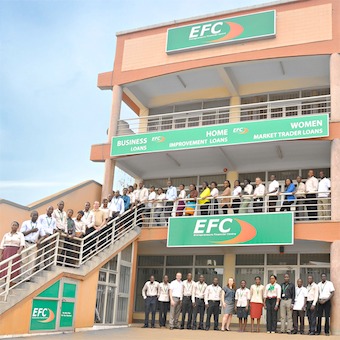By Frank Kamuntu
The Bank of Uganda has initiated the liquidation of EFC, a deposit-taking institution, revoking its license and instructing the cessation of its activities.
Acting Governor Atingi Ego, in a statement, revealed that the decision to close EFC Uganda Limited stemmed from its failure to meet essential governance standards and industry capital thresholds.
The Central Bank asserted that the microfinance institution’s ongoing operations would jeopardize the interests of its depositors.
The institution had reportedly been unable to address its considerable under-capitalization and issues of poor corporate governance.
“This action has been taken because Bank of Uganda has determined that the continuation of EFC Uganda Limited’s activities is detrimental to the interests of its depositors due to the institution’s failures to resolve its significant under capitalisation and poor corporate governance,” the regulator said adding;
“The bank and the Deposit Protection Fund (DPF) will inform depositors of the microfinance institution about the arrangements that will be made to allow them to access their funds.”
Depositors with funds exceeding the Shs10mn insurance cap will be paid by the liquidator after the assets of EFC Uganda have been sold off, according to DPF. The payment amount will depend on the recoveries made.
However, payment to these large depositors will only occur after insured depositors and secured creditors have been paid, as well as after the liquidator has been reimbursed for expenses incurred during the liquidation process, and employees have received all due wages and salaries.
BoU said that other creditors of EFC Uganda must submit their claims to the office of the director of financial stability within 30 days. Additionally, borrowers must continue to service their loans by making payments at the banks’ offices and branches.
The minimum capital required for a financial institution licence was increased in an amendment to the Financial Institutions Act passed in December 2022.
Previously, commercial banks were required to maintain a minimum paid-up capital of Shs120bn and credit institutions were required to maintain a minimum paid-up capital of Shs20bn. These capital thresholds have been increased to Shs150bn for commercial banks and Shs25bn for credit institutions, to be implemented by June.
The minimum capital requirement for microfinance deposit-taking institutions was increased from Shs500mn to Shs10bn, although this was later reduced by parliament to Shs5bn.
The central bank is responsible for appointing a liquidator, or can act as one itself — which appears to be the case, as it has provided the necessary notices to claimants and creditors of EFC Uganda.
BoU has also requested that anyone who is in possession of property belonging to EFC Uganda should hand it over to the office of the director of financial stability.
Have An Advert Or Article You Want To Publish? Whatsapp: +256760530830.


